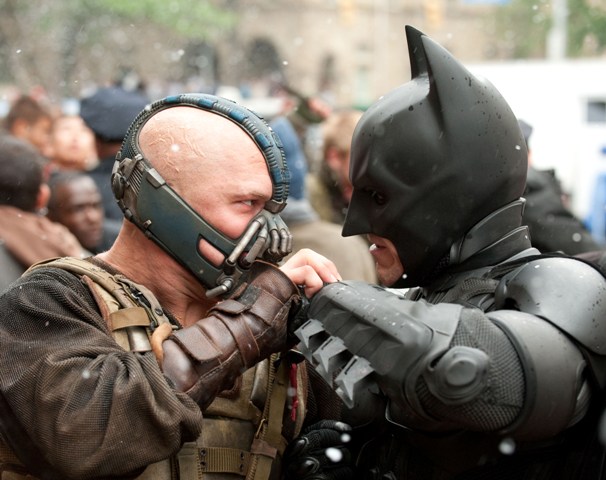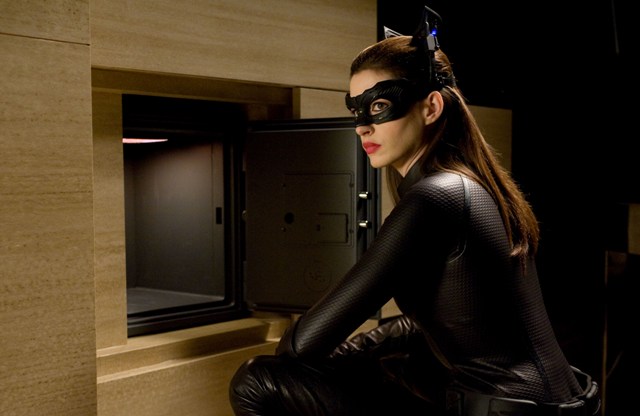CHICAGO – Patrick McDonald of HollywoodChicago.com appears on “The Morning Mess” with Dan Baker on WBGR-FM (Monroe, Wisconsin) on March 21st, 2024, reviewing the new streaming series “Manhunt” – based on the bestseller by James L. Swanson – currently streaming on Apple TV+.
Brian Tallerico: ‘The Dark Knight Rises’ Gives Fans Epic Conclusion to Beloved Trilogy
 Rating: 4.0/5.0 |
CHICAGO – With “The Dark Knight Rises”, Christopher Nolan epically follows through on most of the themes he set up in “Batman Begins” and “The Dark Knight” with amazing technical skill and an ambitious sense of scope. No one can deny the effort and intensity of this closing chapter of the most acclaimed superhero saga in the history of film. However, while this level of artistic integrity is rare in Hollywood blockbusters, it doesn’t always lead to a perfect final product. There is a fine line between epic majesty and self-indulgent bloat and “The Dark Knight Rises” crosses it at times. There is quite possibly a 5-star masterpiece within this film but a few of Nolan’s mistakes as a filmmaker counterbalance some of the many smart ones he has made along the production process of the entire trilogy.
“The Dark Knight Rises” plays with many of the same themes as the two films that came before it, most notably the role of an icon in the public eye and how image can mean as much as action. The image of the Batman can mean more to the people of a city like Gotham than what Bruce Wayne (Christian Bale) actually does behind that mask. Conversely, a powerful anti-authority image can rally a population to anarchy. Ra’s Al Ghul in “Batman Begins,” The Joker in “The Dark Knight,” and Bane in “The Dark Knight Rises” – on many levels, these villains are cut from the same mold. They inspire people to follow them into the darkness through fear, intimidation, and control.

The Dark Knight Rises
Photo credit: Warner Bros. Pictures
We meet Bane, the big bad of “TDKR,” in a powerfully conceived opening sequence involving a plane hijacking. If The Joker was a symbol of chaos, Bane (Tom Hardy) is a symbol of brute force. He speaks through a Darth Vader-esque mask that we learn is basically keeping his face together after beatings he endured in a legendary prison, from which he was reportedly the only person to ever escape. He was born in Hell and he has emerged from it to bring pain to the citizens of Gotham. As conceived, Bane should be a powerful force of nature, an impending storm that sweeps over the film. As realized, he is less than that largely due to a series of poor design decisions (including his muffled audio and cartoonish accent) but also because he’s simply too talkative. With Bane, Nolan falls victim to monologue-ing. Bane would have been a significantly more powerful villain with half of the dialogue. He should have been an imposing figure instead of a talkative madman and it’s a major tonal mistake.
Luckily, Bane is only the least of a quartet of interesting new characters. Joining the familiar faces are Anne Hathaway as Selina Kyle/Catwoman, Joseph Gordon-Levitt as Officer John Blake, a rookie who was once inspired by Wayne, and the great Marion Cotillard as Miranda Tate, a potential love interest for Bruce. What about Wayne himself? Well, he’s been living in the shadows for the years since the death of Harvey Dent and the demonization of Batman. Crime has come to a stop in Gotham. Batman isn’t needed. Life is but a song. And then Bane comes to town. Much of the joy in “The Dark Knight Rises” is in the way that Nolan weaves his characters in and out of his thematic fabric and so I’ll avoid any further plot details. Suffice to say that every character, including ones you know and love like Commissioner Gordon (Gary Oldman), Lucius Fox (Morgan Freeman), and Alfred (Michael Caine) will play a major role in how Nolan has envisioned the end of his trilogy.

The Dark Knight Rises
Photo credit: Warner Bros. Pictures
There’s no denying that “The Dark Knight Rises” is a striking technical accomplishment. It has the sweeping scope, courtesy of Wally Pfister’s fluid camera work and Hans Zimmer’s majestic score, befitting of a modern epic. And when the film does get action-packed, particularly in the final act, one is reminded that Nolan has a true gift for the genre. If none of the set pieces are as impressive as the parallel ones in the final act of “The Dark Knight,” it’s a minor complaint. This is still the kind of action movie that demands your rapt, edge-of-the-seat attention.
And it demands it for 164 minutes. In many ways, “The Dark Knight Rises” is ALL climax, since it’s designed to pay off the entire trilogy. Consequently, it leads to a disappointing repetition of tone. It is aggressive, in-your-face, and non-stop (I literally think the score takes a break once). Little moments of emotion (most effectively from Caine) and whimsy (most effectively from Hathaway) are too few and far between and it makes the film somewhat sterile overall. Even a brief moment of sexuality feels like it happens only because the power went out. Ultimately, I wanted more build or climb to the action when what Nolan delivers is essentially almost all peak of the mountain.
It’s not just in the plotting. Nolan repeats himself here – both trilogy-wide and within this film – more than he has before in his career. There are repetitive monologues and even what could be called a wholly unnecessary character (Matthew Modine’s cowardly cop, designed I believe as a counterpoint to Levitt but ill-conceived). I could cut twenty minutes from “The Dark Knight Rises” (half of Bane’s dialogue and almost all of Modine) and it would be a significantly more potent experience.

The Dark Knight Rises
Photo credit: Warner Bros. Pictures
At the same time, there are too many accomplishments here to just dismiss the film. There’s the aforementioned technical expertise on display, the ambitious thematic work across all three films, and, finally, the ensemble. Hathaway is very good (finding the right balance of sexuality and confidence for Catwoman) but the film belongs to Joseph Gordon-Levitt in many ways. He gives such a grounded, natural performance in the movie that he virtually pulls the movie’s more ridiculous moments down to Earth through his notable skill at being completely believable in the moment. After all is said and done, it’s his work that is the most memorable element of the most high profile film of the year.
There seems to be a pressing desire on the part of many critics and fans anticipating “The Dark Knight Rises” to proclaim it as either amazing or disappointing. It’s almost as if people can’t admit that it’s neither. It’s a powerful film from one of our most interesting filmmakers, a fitting end to what will be a wildly influential trilogy, but it’s also a flawed work, more so than most of Christopher Nolan’s films to date. This gifted director has worked through his stunningly ambitious reimagining of the legend of one of fiction’s most striking characters and, as much fun as it’s been, I’m looking forward to seeing what he does out of the shadow of the bat.
 | By BRIAN TALLERICO |


